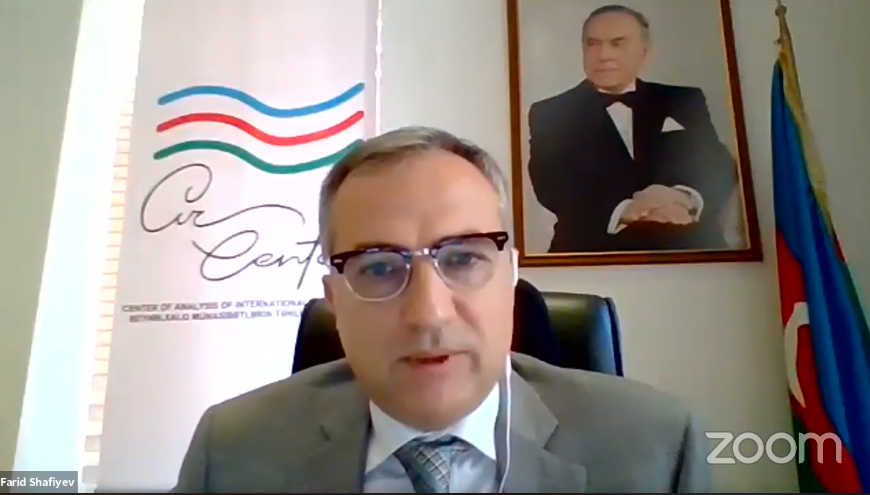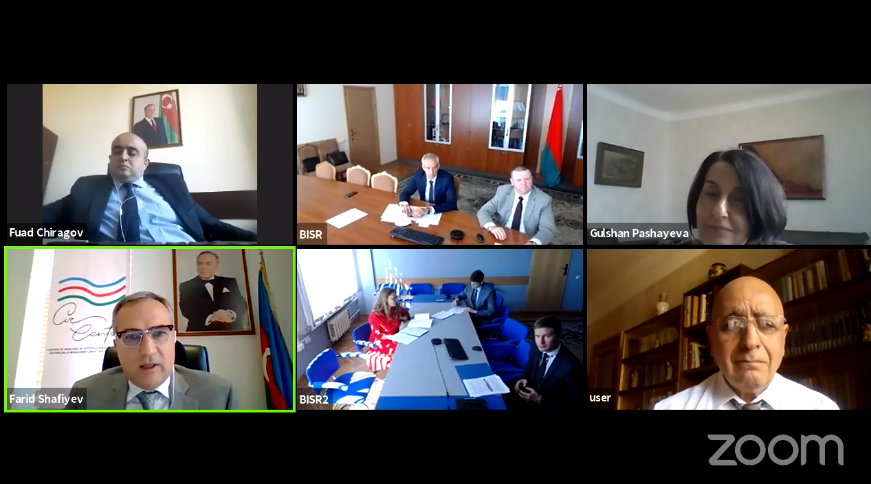The Center for Analysis of International Relations together with the Belarusian Institute for Strategic Studies held a webinar entitled "Development of Belarusian-Azerbaijani relations in the post-pandemic period."
In his opening speech, Farid Shafiyev, Chairman of the AIR Center, said that Belarus is among the countries that have demonstrated a different approach to the COVID-19 crisis. He also stressed the need for conduction of active discussions by think tanks to solve this problem. Farid Shafiyev further added that his predictions about the pandemic were not pessimistic. According to him, once a vaccine is found, the world will soon be able to go back to normal. Speaking about the integration process, the chairman stated that this can be possible only on the basis of territorial integrity, sovereignty and independence of countries.
Speaking next, Director of the Belarusian Institute for Strategic Studies Oleg Makarov said that despite the distance, Belarus and Azerbaijan remain as very close nations and states. According to him, close relations amongst the parties, especially good relations between the leaders of the countries, have made a positive impact on the development of fraternal relations between the people. Oleg Makarov talked about a number of alarming predictions that were made about the post-pandemic period: “We believe that the security of Belarus depends on regional ties and relations. Regardless of external factors, we can maintain these relations on our own. I think that ideas should be put forward to solve these problems. Qualitative analysis and analytics play an important role. We call on our partners for a reliable exchange of views”. He also said that during the pandemic, Belarus was under some pressure for not declaring quarantine. According to Oleg Makarov, the position of the countries in this regard should not be politicized.
In his speech, MP Rasim Musabayov said that no one knows when the virus will end. The MP noted that the pandemic had a serious impact on tourism and aviation, and the production chain was disrupted: “We must get out of this situation, and cooperation is the main way to do this. As a result of the pandemic, the abandonment of office space will increase, flexible work will be implemented, and video conferencing tools will be widely used. Online sales and commerce have also been hit hard by the pandemic. The provision of public services through information technology will also increase. Strengthening of sanitary and hygienic control at the borders will be carried out more widely”.
Rasim Musabayov added that Azerbaijan and Belarus are similar countries and both will always support each other on unrepresented platforms. According to him, there is great potential for the development of relations after the pandemic, and these relations can be further developed in the fields of energy, engineering, agriculture, IT and military-industry.
Sergei Martinenko, head of the International Security Department of the State Secretariat of the Security Council of Belarus, said that until a vaccine is found, the coronavirus will continue with people trying to lead their traditional way of life: “But we have to start changing our way of thinking about the situation. Coronavirus’ not only negative, but also positive aspects can be revealed. As a result of the pandemic, new opportunities are opening up, and online work is already gaining momentum. There is no doubt that our cooperation with Azerbaijan will continue at a high level during and after the pandemic. The heads of state pay special attention to bilateral relations. Our countries can better protect their interests together by cooperating. "
AIR Center’s chief of department Fuad Chiragov said that the two countries have faced a number of challenges and crises that have threatened stability and security in these difficult days. According to him, regional powers and world power centers have special interests in the two countries, but as a result of mutually beneficial cooperation with strategic partners, the countries can act as a subject, not an object of regional and world policy. According to him, along with the fight against global threats, the restoration of territorial integrity is the main challenge for Azerbaijan: “Azerbaijan faces difficult tasks in the coming years. These include resolving the Armenian-Azerbaijani conflict, liberating the occupied territories, diversifying the economy, increasing the share of the non-oil sector in the economy, improving the living standards of the population and implementing large-scale infrastructure projects”.
Asya Pentegova, an analyst at the Belarusian Institute for Strategic Studies, and Ivan Kharkov, head of the EU and US division, spoke about key trends in the post-pandemic period, the economic impact of COVID-19, future prospects for Belarusian-Azerbaijani relations, information attacks and brainstorming.
The event continued with a question and answer session.







